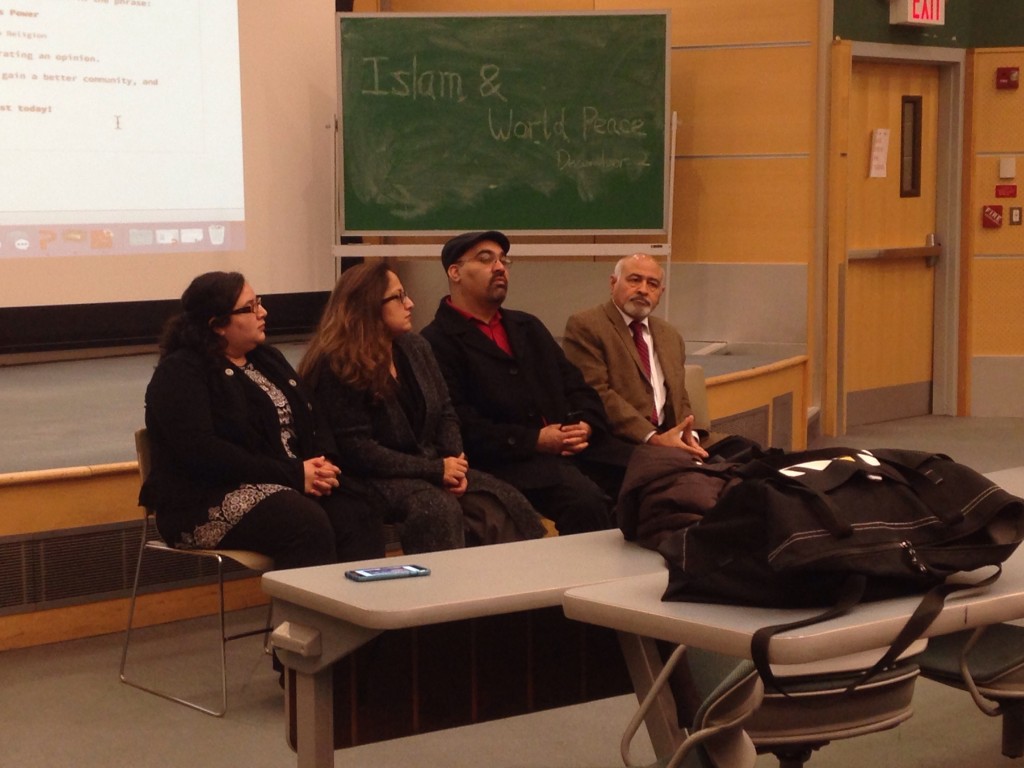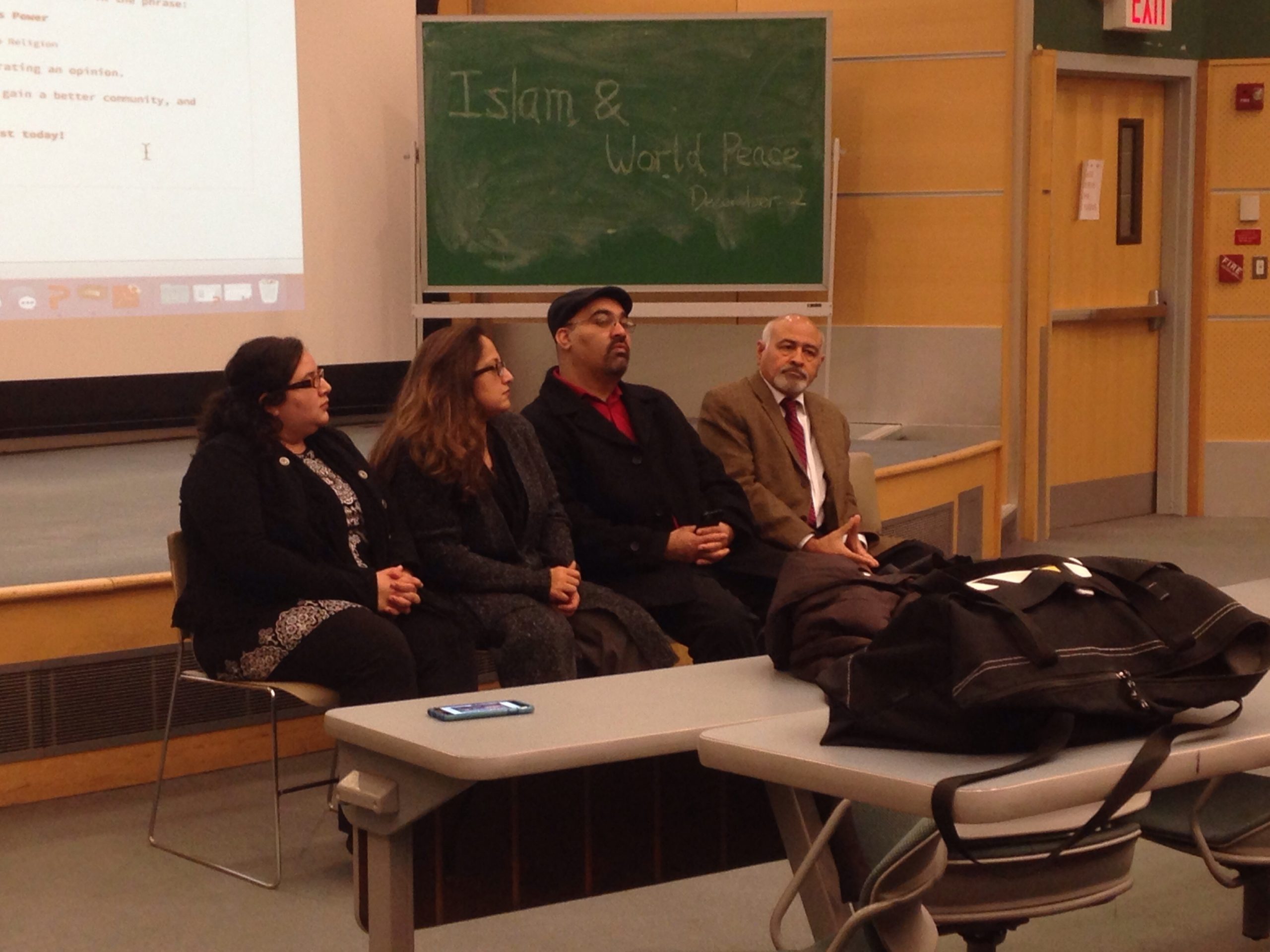Last updated on Dec 9, 2015
By Maxime Devillaz
Co-Editor-in-Chief
Dr. Iftikhar Ahmad’s intentions were clear. ”These barbarians have nothing to do with Islam,” he said, referring to the radical terrorist group, the Islamic State. “Most of their victims are Muslim,” he added, blaming the media for its distortion.
The social scientist, and associate professor in the college of education, invited the community to a common hour lecture on Wednesday, Dec. 2, to discuss “Islam & World Peace.” Professor Shaireen Rasheed, who teaches philosophical foundations and multiculturalism in the school of education, and Zeshan Hamid, President of the Shan Group in Hicksville, joined Ahmad in the forum to reflect on the Nov. 13 attacks in Paris, France.
“I feel like I have to start with Islam 101,” said Rasheed, providing each of the three-dozen students and faculty members gathered in the Humanities lecture hall with a basic cheat sheet. “Islam is not a religion based on people or geographical areas; it’s a fluid concept, which makes it hard to discuss.”
“Since 9/11, the theater of war has gone global,” Rasheed said, describing fundamentalism, in any form, as a perversion of the actual religion. The speakers, all American-Muslims, shared their pre- and post-9/11 stories to explain how the everyday lives of most Muslims have changed—now peaking at its worst in very long.
Rasheed referenced her to-be published book, “Sexuality, Islam and the War on Terror,” saying that “global freedom, as defined within the context of the ‘War on Terror,’ has been defined as the war against not just the fundamentalist factions but against the threat of upholding liberal values, a cornerstone of Western democracies.” She explained that the language often used in today’s terrorism discussion is uttered as a value debate relating to what she calls, ‘The Clash of Civilizations.’ “And Islam,” she added, “which is not a monolithic category, is bearing the brunt of this, as are Muslims.”
A student questioned how people—Donald Trump and Fox News, as examples—get away with their anti-Islamic commentary, which she deemed offensive. Rasheed referred to the idea of “Islamophobia industry,” which she explains as “using fear to make a lot of money.” Citing Nathan Lane, a professor at Georgetown’s Center for Muslim-Christian, she stated that there is an ongoing industry to promote Islamophobia, where donors pay off public figures to express anti-Muslim propaganda.
Rasheed describes Lane’s book on the subject as “a disturbing account of how certain networks are dedicated to convincing the larger public that Islam is inherently a violent and dangerous religion, that Muslims as a whole adhere to such violence, and that both Islam and Muslims should be marginalized in this country.”
Lane looked at Richard Hofstadter’s 1952 book, called “The Paranoid Style in American Politics,” to explain the seemingly popular pattern of creating impressions by way of fear throughout the history of American public culture. “He refers to waves of the Enlightenment Illuminati in the Revolutionary War era, anti-Catholicism in the period of late 19th and early 20th century immigration (an issue resurfacing again), anti-communism in the McCarthy era and Anti-Semitism in America and Europe,” she said.
The cheat sheet that Rasheed distributed emphasized the Jihad clause, often questioned by non-Muslims. Rasheed explained the Arabic translation for the word Jihad as “struggle against your own desires,” which has indeed been interpreted differently by many. According to the book of Ayesha Jalal, a South Asian scholar, the Islamic Theological tradition includes strict codes for Islamic governments. How to implement Jihad into action is one of them, but some fundamentalist groups, such as IS, have misrepresented the codes.
“Isn’t it in the hands of people to interpret what it means? Who regulates what’s right?” asked Ian Jonson, a sophomore international studies major, after the event.
“This issue is complicated and requires a nuanced examination of social, economic and political factors as well,” Rasheed said. “Pakistan is a case in point in that the rise of fundamentalism there has been financed by certain countries and is gaining traction in poor sections of the country, usually by the local religious leaders.”
Hamid explained that the American presence in Pakistan, and other countries, fuels the already bad social standards, and becomes an effective tool of persuasion for radical Imaams with their own political agenda. “They point at the drones, ‘All these drones, it’s them,’ or they use your social struggles and say, ‘America is the reason for this problem,’” Hamid said.
He gave an example of a young man. “They show him a girl. If you do this and kill yourself, you’ll go to heaven and get all the girls you want in the world,” Hamid said. “They get brainwashed.”
”My father is Muslim [so] events like this can really hit home for me, since it is such a sensitive subject to talk about,” said Alanna Hynes Gür, a senior international business major, who was appreciative of the positive response among fellow students attending the lecture. “One of the audience members stood up and talked about how his opinion had changed after coming to this presentation; I just wish there were more people like this man who were open-minded to the idea of Islam.”
Jonson praised the speakers for bringing up such a serious, timely issue, but he was one of a handful of students who thought the presentations could have been more effective. “It did feel . . . at times, as if they weren’t fully prepared,” Jonson said.
Rasheed admitted that the topic was hastily proposed just before Thanksgiving, because of the many questions students had posed in class following the Paris attacks. “We had three days to organize the event, publicize it and get speakers,” she said, stating that she had envisioned more of an “everything you wanted to know about Islam but were afraid to ask” type of dialogue.
But Rasheed believes that opening up the discussion was significant enough at this stage, and plans to continue talks over the spring semester are ongoing.
“Given the San Bernardino shootings, the climate is even more urgent in which to ensure that backlash against American-Muslims is kept to a minimum, while at the same time trying to understand the political, social, [and] economic climate of the current agenda of terrorism,” she said.
To Hamid, speaking at the event was never really an option, as he said, “I cannot let your mind think that I’m a terrorist, that my religion promotes terrorism.”







Be First to Comment